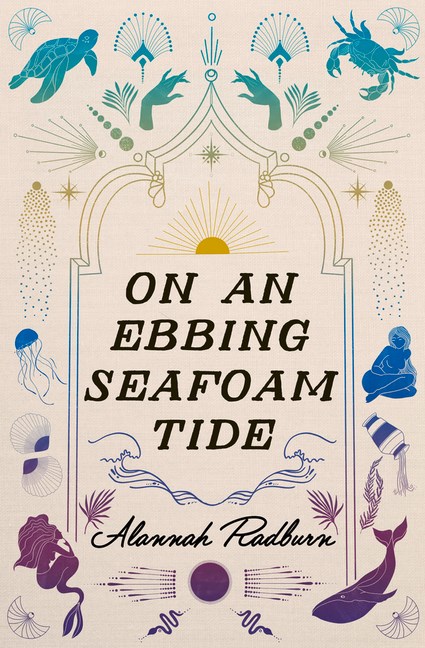On an Ebbing Seafoam Tide
July 19, 2023
Alannah Radburn unabashedly shares pieces of herself that others might hide from strangers but that we should be more open about: the overly arduous fight for justice that women endure, the strength it takes to leave a bad relationship, a queer love story without stigma.
On an Ebbing Seafoam Tide by Alannah Radburn, Central Avenue Poetry
Summer days, weeks, and weekends have been passing quickly, and I find very few moments when I want to sit still and read a book. I’ve mostly been keeping up with newly published works in the form of audiobooks—listening on walks, while exercising, editing photos, or undertaking other creative projects—but nonetheless, I like to keep a physical copy of something in my purse or in my car just in case. One recently published, purse-sized volume that got me to slow down this summer is On An Ebbing Seafoam Tide by Alannah Radburn.
This book of poems was originally published independently in 2021, so it’s very exciting that it is being republished traditionally by Central Avenue Poetry, making it easily available across all of the United States and Canada with the addition of new poems, new edits, and a new cover design, which is what initially drew me in. On this lightly textured paperback cover is a frame of marine and mythical illustrations, which provides a useful but not overly interpretive introduction to the range of themes and aquatic environment of the poems.
The structure of the poems also makes this collection memorable: none have titles and each end with an indented and italicized final line. I really enjoy the flow this creates, of each section’s narrative flowing like a current through each poem.
The book’s first section (“Seabreeze”) is gentle and buoyant in tone. These poems revolve around the romantic details of a lover (only referred to as “she” and “her”), being in love, and experiencing being in love together, all viewed in a forgiving golden hour light. The long string of positive poems initially made me skeptical of the narrator and the book’s direction—which might be more reflective of some cynicism of my own. I wondered if the Pollyanna point of view was intentional and if the whole collection would be similarly dreamy—or “wrapped in sunlight,” to borrow a phrase the narrator uses to describe their lover’s laughter.
[I’ll mention here that the vivid nautical imagery in the poems made me think the author was from an idyllically tropical North American location like Hawai’i, California, or Florida. Alannah Radburn actually began writing the book near the Pacific but currently lives in Québec, Canada. I don’t know if the geography that inspired the author should influence my experience of the book, but it does. Maybe because I’ve never stood on the coast of Canada—the closest I’ve gotten is Niagara Falls or somewhere around Yarmouth, Maine—so imagining the ocean from that area is all fantasy to me, as whimsical as my imagination wants it to be.]
The story swells through small, single-sided glimpses into the relationship, and the wave of adoration crashes with a noticeable and pleasantly surprising shift in tone in the second section, “Pulling Tides.” The first poem:
a relationship is perched on the windowsill,
delicate as a tomato.
here is where the problem lies;
one person believes it is ripening
while
the other person believes it is rotting.
This section is introspective as the narrator examines and reexamines her relationships: with her lover, her family, the earth, and herself. The narrator is healing from idealism, opening to honesty and once again to love. Radburn shares moments that are more memoir than myth, more hope than horror, with more strength and more vulnerability as the story continues.
While the first section is anchored to the present moment, the poems in the third section (“Ocean Blues”) summon a damaging past.
i am a woman of two bodies:
one survived the initial scream.
the other houses the echoes.
The poems shift between tumultuous, half-to-full-page poems and others that are only three lines long. These are the first to mention a “he,” whom the narrator addresses directly in a few poems, castigating him for mistreating her and other women.
It is in reading these that I realize why I appreciate the poems that tackle difficulty more than those that recount love: they take a lot of emotional work and openness, but also, reading them feels like experiencing some sort of healing alongside the writer. Radburn unabashedly shares pieces of herself that others might hide from strangers but that we should be more open about: the overly arduous fight for justice that women endure, the strength it takes to leave a bad relationship, a queer love story without stigma. She expresses this concept of healing trauma by sharing it succinctly in one of the book’s insightful four-lined poems:
the truth is much less frightening in a poem.
it's not as scary to see a dead body,
call it art
when it’s in a museum.
On an Ebbing Seafoam Tide is a captivating, purse-sized museum of memories, emotions, and love.



